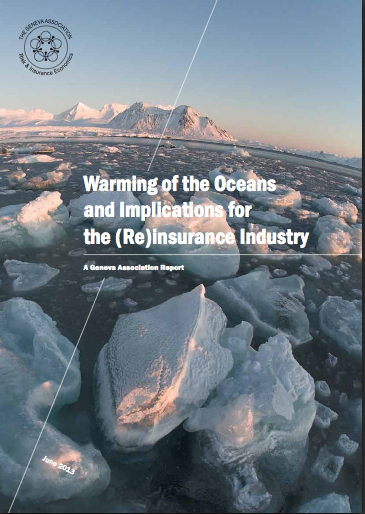Think Tank Recommends Industry Climate Activism.
The world’s leading insurance think tank is calling for a new definition of normal weather conditions because of the impacts of climate change and ocean warming on the insurance industry. In its thirty-page report, Warming of the Oceans and Implications for the (Re)insurance Industry , the Geneva Association concludes:
, the Geneva Association concludes:
There is new, robust evidence that the global oceans have warmed significantly. Given that energy from the ocean is the key driver of extreme events, ocean warming has effectively caused a shift towards a “new normal” for a number of insurance-relevant hazards. This shift is quasi irreversible — even if greenhouse gas (GHG) emissions completely stop tomorrow, oceanic temperatures will continue to rise.
It also proposes a “paradigm shift” from using historical data for calculating property risk to using long-term predictions. But then goes on to say:
Due to the limits of predictability and scientific understanding of extreme events in a non-stationary environment, today’s likelihood of extreme events is ambiguous. As a consequence, scenario-based approaches and tail risk modeling become an essential part of enterprise risk management.
“Tail risk modeling” helps protect insurers and reinsurers (companies who insure insurance companies) from unacceptable financial risk caused by sudden or unpredictable extreme events, such as Hurricane Sandy with its damages of up to $50 billion. Presumably, the companies themselves will take charge of creating the risk modeling and weather scenarios that define the “new normal” — an unwelcome prospect for those who already struggle with their insurance policies under the old normal.
The insurance industry’s interest in climate has been growing steadily for decades. After all, it has much at stake. But redefining ambient weather, and thereby trimming the rolls of who is insured for what, is a new, and unsettling, prospect. It is consistent with the theme of self-interest evident throughout the report — protection for insurers from “market failure” while still enabling them to “comply with regulatory requirements and ultimately improve their ratings.”
But the brief study makes a point of speaking to multiple interests. The Geneva Association, controlled by a board of directors composed of executives from the largest insurance companies in the world, is an unabashed believer in climate change and ocean warming. It does a commendable job of defending its position, citing substantial scientific and other sources. At the same time, a nagging resignation pervades the report, almost implying it may be time to throw up our collective hands, accept what’s coming, and create new rules, even about weather, to protect the economy. The regulatory hurdles would be considerable, but the report’s approach may also prove a sly seduction in some sectors.
I suspect there are climate deniers waiting for just this — the world’s largest business encouraging them to redefine weather, leap over the climate debate, and land gracefully in a “new normal,” focused on regulatory assistance for insurers and profiting from unrelenting climate change, rather than acting to prevent it.
The report has a surprise ending, however. With industry self-interest still firmly in hand, it calls upon insurers to be activists and lobbyists for adaptation, risk education, energy investment, and regulation of greenhouse gases. Government officials should listen when the loudest voices in a $4.6 trillion industry speak. But when it comes to climate, most are entrenched, adept at picking and choosing their pet interests while sidestepping the big picture. It will be an interesting face-off, if it ever occurs. For their part, environmentalists should hold the insurance industry to the Geneva Association recommendations below (while of course blocking industry attempts to control the definition of weather):
The insurance industry should play an active role in raising awareness of risk and climate change through risk education and disseminating high-quality risk information. In addition, there is real benefit for the industry in supporting and encouraging adaptation through innovative product design. This can and should be done in collaboration with local authorities through engagement in public–private cooperation. This will, as well as enhancing reputation, lead to a more resilient building stock and an overall reduction of risk.
On the investment side, there are new market opportunities associated with the transition to a low-carbon economy. Investment in innovation and global capacity-building for new energy technologies and infrastructure does not only promise good returns but also contributes to the reduction of greenhouse gas emissions which will ultimately create a more resilient society. To support this transition, the industry should use its unique knowledge base to inform the debate on climate change and actively lobby government to take action to reduce risks and curb emissions of greenhouse gases.
These actions, alongside the support of science in tackling the major challenges in projecting the impacts of ocean warming and climate change generally, will help the insurance industry to avoid market failures and increase societal resilience.











Hi John, I am the Head of Communications at The Geneva Association and wanted to provide some more background to the report and respond in that context to some of the points in your blog which do not correctly represent our position.
The “new normal” referred to in the report reflects the fact that weather patterns are changing and becoming more extreme and therefore weather considered to be ‘normal’ will be more extreme than we have experienced in the past. We are not trying to define the policy-terms of what constitutes normal weather in the report.
We go on to say that even if greenhouse gas emissions were stopped completely today, ocean temperatures would continue to rise due to the gasses already emitted.
One of the recommendations of our report calls on insurers to take into account this ongoing change and to accelerate the development of dynamic models and tail risk modelling that are better at accounting for this changing environment.
We are not “redefining ambient weather” as you suggest.
In its most simple form, an insurance policy is a mechanism by which the policyholder shares an uncertain risk with an insurer so that a signficant occurence of that insured risk doesn’t significantly affect the policyholder. If the value at risk increases, so will the cost of the policy. In the same way, if the chance of the risk occurring increases (which it is in many cases due to the changing climate), so will the cost of the policy. What we are saying in the report is that insurers need to modify the way they model risk because climate change means that the risks are changing. Insurers must be able to predict that risk as accurately as possible and our suggested means of modelling will address that.
I hope this help explain our position and alleviate your concern that there is something Machiavellian about the report that we believe represents a positive contribution to the adaptation measures necessary in the face of our changing climate.
Kind regards,
Anthony